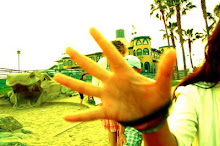The Creative Process
By Paulo Coelho
Every creative process, be it literature, in engineering, in information technology - and even in love - always respects a same pattern: the cycle of nature.
a] field plowing: at the moment the soil is plowed up, oxygen penetrates where it was not able to reach up to then. The field gets a new face, the soil that was on top is now underneath and what was beneath turned into surface. This inner revolution process is very important, for just as the new face of that field will be seeing the sun for the first time, and be dazzled by it; a reassessment of our values will enable us to see life with innocence and no naivete.
b] seeding: every creation is the result of a contact with life. The creating Man can not lock himself up inside an ivory tower; he needs to share his human condition. He will never know what will turn out to be important in the future, so that, the more intense his life, the more possibilities he will have in order to find an original language. Le Corbusier used to say that "while Man wanted to fly imitating the birds, he was never able." The same happens with the artist: although artists are translators of emotions, the language they translate are not entirely known by them, and if they try to imitate or control their inspiration, they will never reach the goal they wish to achieve.
c] maturing: there is a time in which a work of art writes itself into the author's soul - before the artist ventures to manifest it. In the case of literature, for example, the book is influencing the writer and vice-versa. It is to that moment that the Brazilian poet Carlos Drummond de Andrade refers to when he says that we should never collect the verses that go lost, as they do not deserve to see the light of day. I know people who take notes compulsively of everything crossing their mind during the maturing stage, not respecting what is being written in the unconscious. The result is that those notes, outcomes of the mind, end up disturbing the results of inspiration. The creator needs to respect the development, even though they know - just as farmers do - that they just have a partial control over their field. They are exposed to droughts or inundations. But if they know to wait, the stronger plant, which resisted to the entire inclemency, will come to light with all its strength.
d] harvesting: this is a moment in which Man will manifest what he planted and left to mature, on a conscious level. If he harvests too soon the fruit will be green, if he harvest too late, it will be rotten. Every artist knows to recognize the arrival of this moment. Although certain questions have not matured enough yet and some ideas might not be clear and crystalline, they organize themselves as the work of art is being created. With discipline and no fear, artists understand that it is necessary to work every day until their works are complete.
And what should we do with the results of harvesting? Again, we look at Mother Nature: it shares everything with us. Artists who want to keep their works to themselves are neither being fair to what they were given in the present moment, nor to the inheritance and the teachings of their forefathers. If we leave our seeds stocked in the barn, they will end up decaying, even if they have been harvested in the right moment. When harvesting is done, the moment in which it is necessary to share one's own soul, with no fear or shame, has arrived. That is the artist's mission.
18.7.11
Subscribe to:
Post Comments (Atom)


No comments:
Post a Comment